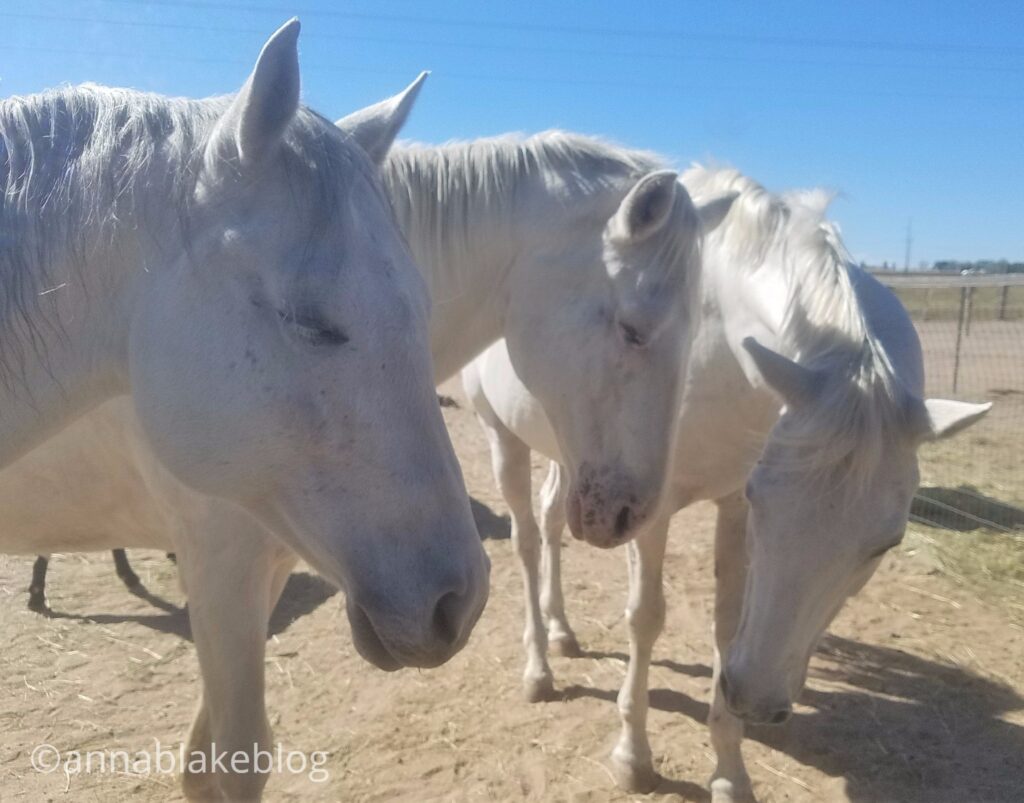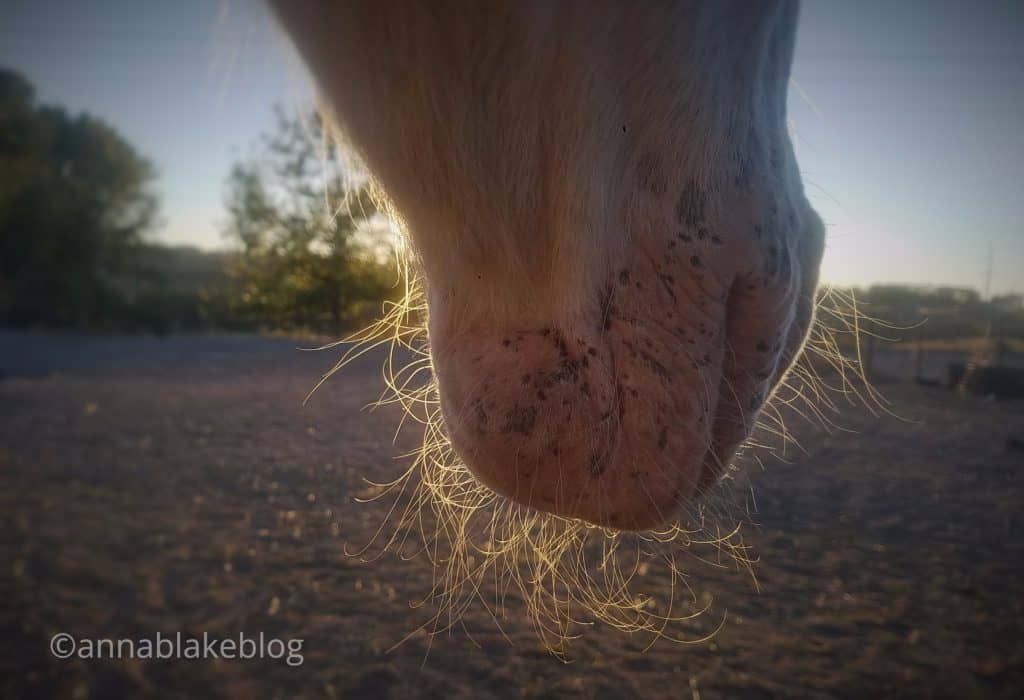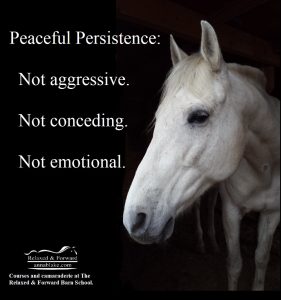
There is a wild stallion on the ridge fighting all comers for his harem of mares. We think aggression and violence maintain order in the band. Hence, we train using fear-based methods to prove we are the real alpha. It might work on the Disney channel, but it’s total fiction. Herds of horses are cooperative, knowing there is safety in numbers and having behaviors that support survival. The word harem should choke in your throat.
Researchers have debunked the concept of horses having a dominance hierarchy for decades, but we just won’t let it go. We want to ignore research and ethology and common sense because we grew up with the old story. We like to exaggerate the similarities between horses and humans and minimize the overwhelming differences. It’s all fine and dandy until someone gets hurt.
Sometimes when I’m teaching Calming Signals, it almost feels like people listen as if I’m a fortune teller. I ask questions and they’re shocked at how I could know that about their horse. Posing other behaviors that might confirm my suspicions, people think I’m hiding in their barn watching them. Like I have cracked a code or heard secret gossip. I’m listening with my eyes is all. Certainly not psychic.
It still happens. When people introduce their horse, they tell me he’s at the bottom of the pecking order, as if that’s good. That their mare is the alpha mare, as if a superficial name might justify her behaviors. They tell me their gelding is right in the middle of the herd as if he has no individuality but is socially acceptable. We don’t do it with bad intentions at all. We just like things to be in tidy compartments.
We like to think the world is linear, that we can put numbers in order, and end up understanding mysteries. We think herd position defines them, but the social structure of the herd has more nuance than that. The horse’s calming signals, their language, must not be dismissed without listening and understanding.
Science says only one genus of animals has a dominance hierarchy and it shouldn’t be hard to guess who. Humans and other primates. Do we define other animals by our traits, so they make sense to us? Anthropomorphize them? We’ve been using words like alpha stallion, boss mare, or worse, as well as subservient terms, for so long that the habit is hard to change. We love to see our animals as versions of ourselves, but do those jokes cause damage?
There is something like a hierarchy in your barn, but it might be the opposite of what you think. Say there is a loud noise in the woods, eating stops, and all heads lift. Usually, there is one horse in the pen that everyone looks at to see if the environment is safe. If that horse begins to move away or goes back to grazing, the rest of the herd follows. But it’s because of that horse’s judgment and experience, and not aggression or dominance.
That’s how my Grandfather Horse got his name. The spooky buck-fart youngster changed a little bit every year until he became the herd’s heart and anchor. Not the loudest voice, not a warrior spirit, not through an election by the herd. He won his position by attrition and by being old. The other word for that is wisdom.
Herds are always in flux as members mature or die or get moved to another barn, but more than that, herds are cooperative. Survival requires it. Herd animals instinctively know there is safety in numbers, and that loners are easy prey. They need each other, they don’t want to hurt each other. Individuals share leadership. If we oversimplify their relationships and trivialize their calming signals, we lose our understanding of them.
Why does using words that relate to hierarchy or pecking order matter so much? I have a list!
- Because a horse’s herd position has never saved them from neglect, rough handling, or overuse. Horses don’t benefit from our story.
- Because for much too long we have justified the use of fear and violence in training by continuing the false domination narrative.
- Because too often we think the horse with the most anxiety, pushing others around, is the leader when they are asking for help.
- Because we mistake food aggression for leadership when the horse may have ulcers or other pain that we can’t easily diagnose.
- Because we think it’s normal that some herd members get bullied, but it still damages those horses mentally, as well as physically.
- Because the one with separation anxiety isn’t being spoiled or stubborn. They’re herd members. It’s their instinct to stay together.
- Because the one who paces or paws in a stall has anxiety about the scarcity of resources. (Horses require friends, forage, and freedom.)
- Because it can seem easier to demean other horse owners than to change our own lifelong training habits.
- Because if horses aren’t dominant or submissive, we must rethink everything we think we know about them.
Sometimes our insecurities make us want to think horses are less than us. Sometimes we feel self-worth and public acclaim for saving them. Both positions, dominators or saviors, place us above the horse in our habit of hierarchy. Meanwhile, horses understand collaboration. They don’t want to be slaves or have slaves. How would things change if we strived to be their equals?

…
Relaxed and Forward Training by Anna Blake is no longer on Facebook because of repeated hacking. If you or your horse appreciate my writing, please share, subscribe to this blog, or join us at The Barn School.
 The Barn School, is a social and educational site, along with member sharing and our infamous Happy Hour. Anna teaches courses like Calming Signals and Affirmative Training. Everyone’s welcome.
The Barn School, is a social and educational site, along with member sharing and our infamous Happy Hour. Anna teaches courses like Calming Signals and Affirmative Training. Everyone’s welcome.
Want more? Become a sustaining member, a “Barnie.” Subscribe to our online training group with affirmative demonstration videos, audio blogs, daily quotes, free participation in “group lessons”, and live chats with Anna. Become part of the most supportive group of like-minded horsepeople anywhere.
Visit annablake.com to find archived blogs, purchase signed books, schedule a live consultation, subscribe for email delivery of this blog, or ask a question about the art and science of working with horses.
Ride for a new brand, find our Relaxed and Forward swag at Zazzle.
Affirmative training is the fine art of saying yes.
…
 Available Now! Undomesticated Women, Anectdotal Evidence from the Road, is my new travel memoir. Ride along on a clinic tour through 30 states, 2 oceans, and 14k miles with me and my dog, Mister. It is an unapologetic celebration of sunsets, horses, RV parks, roadkill, diverse landscapes, and undomesticated women. Available now at Amazon, Barnes and Noble, and signed copies from me.
Available Now! Undomesticated Women, Anectdotal Evidence from the Road, is my new travel memoir. Ride along on a clinic tour through 30 states, 2 oceans, and 14k miles with me and my dog, Mister. It is an unapologetic celebration of sunsets, horses, RV parks, roadkill, diverse landscapes, and undomesticated women. Available now at Amazon, Barnes and Noble, and signed copies from me.
…
Good morning and Happy Friday
After taking the Calming Signals course, I realized that my Karma, whom I had always thought was not high in the herd dynamic, was really the one everyone looked at when things got scary or complicated. The course also let me see Starmans needs when I had been thinking of him kind of as the class clown (a designation from a trainer) when it’s really anxiety and as we have moved to address his issues he has become a much happier boy. My friend and her husband are not horse people but they are working with the string used at Old Tucson. The leader wrangler is old school and you can see it in the horses. I have shared some insights about calming signals with my friend, because she so loves being with the horses and I don’t want her to get hurt.
Thanks, Mary. It’s such a pleasure to hear your herd has benefitted. And especially thanks for sharing with your friend. I don’t want her hurt by a misunderstood horse either…
How do you help a horse that has become a bully from past human abuse or neglect? We had a boarder come whose horse would charge anyone in the herd (he was okay with people). We have 18 members in our herd and they are pasture boarded, out 24/7 and they knew this guy was unbalanced because they wouldn’t go near him (except one mare). Our typical way of helping a horse that has been mistreated and become aggressive is to just leave them alone for as long as it takes the herd to help them (if their owners will let us). These owners wouldn’t do that and ended up taking him elsewhere. But I just wondered if you had advise for when this happens.
I would check him to see if the aggression was pain related first. (Not that the owners would agree) and yes, what you say. Time is the healer usually, but I’d so a slow as molasses process of joining him into the herd, separate pens, trying to find one buddy horse, etc., until a herd is possible. Sometimes it’s taken a year or more. It also makes me wonder if the horse has been kept isolated or is perhaps an orphan who didn’t learn social skills. So many unknowns. I notice people are too impatient with horses… meaning the owners. Thanks, Cathy, for doing what you could.
I find it so interesting to watch interactions between herd members (I am not a member of the herd but am part of their world). They will take turns nudging each other off piles of hay (there are multiple, well spaced out) and a minute later the two are eating from the same pile. They don’t have to get in each other’s face to say what they want. If one is not watching closing it can be easy to miss the message some times. I found I actually enjoy asking the horse instead of telling, unless of course it is urgently safety related. An extra 30 seconds to obtain permission from the mustang to brush out the burrs in her mane. Giving the mule who walked away when being groomed the chance to walk back and say ok is a lot nicer for me than chasing her around her stall. I am an old gray mare with still lots to learn.
Thanks, Pat. You may be an old gray mare, but you have learned to be polite. That’s the important part. And you got to see a mule walk back to you. What’s more beautiful than that?
Well I own 18 horses. Two are geldings that were my breeding stallions. They are used as leadline horses now as they dont spook easily. We take them to shows in the same box but there is a barrier between them . They don’t run in the same paddock, because I am a vet and I HATE treating injured horses! We have a young stallion, who is 4 and being sold as a breeding stallion. But he runs with the geldings ( which do not include the 2 retired breeding stallions) . The geldings look after our young stallions and teach them manners. All the young colts stand back at feeding time and let the two senior geldings go first, then follow them through the gate in order of precedence. As a veterinarian and qualified animal behaviourist, I always look at behaviour of horses in a group to find out which horse is dominant and why. If I then catch a horse, I lead it to the gate and sideline the dominant horses deliberately.
In the US we use “uncle” geldings to school weanlings, too. I’ve trained stallions and always found them to be easy to work with, like you say, good citizens. I appreciate the work that Lucy Rees has done and written about. Thanks Cheryl.
Keep reminding us to check for pain in our aggressive horses, Anna. I have found that it is, more often than not, the culprit behind their “misbehaving.” Thank you so much!
Especially when “normal” behaviors change, always my first thought. Thanks, Lynell.
I remember a few months ago at the first session of the Calming Signals course, we were introducing ourselves and our horses and I described Zephyr as “tough and scrappy”. I think you raised your eyebrow at me but didn’t really say anything. I saw him like this because the first time I tried to put him in with my other horses I expected that, if anything, the other two would “bully” him as the new kid, but within minutes he had them both cornered and got a good bite in on the oldest one’s back. I separated them and waited until I felt like Zephyr told me he was ready and tried again. It went better, but he was still being what one might label “dominant”. Once I learned in your class that it was likely anxiety driving him to act that way it totally changed the way I saw him. Fast forward to now, lots of breathing and saying “yes” and going slow, and he seems to have let go of so much of that anxiety and our little herd is sweet and peaceful. I’m so grateful for everything I’ve learned in your classes.
Great comment, Kate. That’s such a big part of it. We get to see the “dominant” horse in a kinder light. but I have to laugh. I have two geldings and one mare…along with a donkey and mini. My smallest herd ever. When I was boarding, I took months to introduce new horses to the big herd. MONTHS. Perhaps too conservative, but they didn’t belong to me. Now, I just want these three to be together but threesomes seem to be hard, one of them always uncomfortable… Just earlier this week, I tried it again, almost a year since the last try. And with another year of maturity for all of them, it’s working. Scheesh. Years for this threesome.
I know I’m lucky these three settled in so well, and I know I didn’t have much to do with it at all. But once I saw Zephyr’s tough guy act as anxiety it at least helped me be aware and try not to cause him even more anxiety than he already has.
You’re doing such a great job with him.
Your foundational message here remains perpetually relevant. Maybe someday we wont need as many reminders ! In the 2 horses here , it’smuch more useful to see that Tango is the anxious one, and Cash is showing him a more peaceful way..Uncle Cash. ❤
A good strong finish in this essay . The last 2 sentences are just the best.
Thanks, Sarah. Uncle Cash. Who’da thunk it? So happy to hear it.
Anna, I wish it wasn’t so hard being human (and so do our horses). We really do judge non-human creatures and our fellow humans through judgmental and authoritarian eyes. I wonder why we think we know best? Does instinct work better than reasoning? If one evaluates the state of our planet/climate, politics, and our success at world wide peace, I think we are not using our cerebral capabilities to their full capacity.
I’m going out right now to clean a wound on one of my horses legs. I’ve reasoned out a plan, but I hope my instincts tell me when to abandon my plan and search for a solution by observing my horse carefully.
I’m not sure why humans have superiority complexes but cats aren’t falling for it. Good luck with the leg wound. He’ll know you’re trying to help. Thanks Laurie.